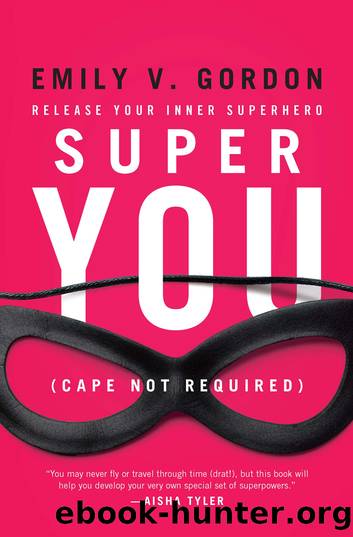Super You by Emily V. Gordon

Author:Emily V. Gordon [Gordon, Emily V.; Partlow, Hannah Nance]
Language: eng
Format: epub
ISBN: 9781580055765
Publisher: Seal Press
Weaknesses We Can Change: Sneaky Self-Destructive Behaviors
I have friends who will rail on about how drug addicts ruin their lives with their unhealthy behavior, and then not eat until dinnertime because theyâre swamped at work. Not only do they not make the connection between the two unhealthy habits, but they fail to see their behavior as anything but noble, the badge of a hard worker. Of course, while hazardous substance abuse is a bit more severe than workaholism, donât for a second think that intense overwork doesnât jeopardize your health. Self-destructive behavior comes in many formsâbut when itâs for the greater good, like burning yourself out at work, yes, it punishes you, but it also makes you look like a superstar for working so hard. Watch out for that sneaky trap.
I was self-destructive for years, first in a pretty obvious, after-school special kind of way, and later in this more sneaky way. I didnât feel worthy of good treatment, so out of hatred of my body I put myself in dangerous situations and harmed myself in as many ways as I could. I was casual with my health and well-being. I kept people around me who were cruel to me because I was lonely. The more obvious self-destructive behaviors of people in this mindset might include:
Picking fights with people who care about you out of wanting to release anger
Substance abuse (not just use, but abuse)
Unsafe sexual promiscuity
When I grew up a bit and went to graduate school, I proudly announced myself âcuredâ of my self-destructive habits because I no longer did risky things that made my friends shake their heads and proclaim I was nuts. During this time I had regular sixteen-hour daysâclasses, internship, two jobsâfor which I perfected the art of eating while driving. I chose to work constantly rather than take on loans and long-term debt, and I took on extra responsibilities because I wanted to get as much out of the experience as I could. But these choices quickly surpassed âusefulâ and drove deep into self-destructive territory. The truth is that graduate school itself is self-destructiveâit just has a positive goal. Some of these less obvious self-destructive behaviors include:
Getting into Twitter fights with strangers
Hooking up with lots of partners in a way that makes you feel small
Not giving yourself any downtime
Then, when I graduated and found my first real job, I still burned the candle at both ends, mostly out of feeling as if it was the only way to be an effective adult. My effectiveness had to come at the cost of my health. At some point I realized I needed to do more work on myself: I needed to address why I felt the need to harm myself physically and emotionally, regardless of the cause. For me, self-destructive behaviors boiled down to feeling like I needed to apologize for my existence, and offering myself up as a sacrifice and an apology.
So how about you? Letâs say you consistently put other peopleâs needs ahead of your own.
Download
This site does not store any files on its server. We only index and link to content provided by other sites. Please contact the content providers to delete copyright contents if any and email us, we'll remove relevant links or contents immediately.
Daring Greatly by Brene Brown(5643)
You Do You by Sarah Knight(4027)
The Confidence Code by Katty Kay(3569)
He's Just Not That Into You by Greg Behrendt & Liz Tuccillo(3303)
Ikigai by Héctor García & Francesc Miralles(3145)
Toxic Parents by Susan Forward(2808)
The Courage to Be Disliked by Ichiro Kishimi & Fumitake Koga(2798)
Make Your Bed by William H. Mcraven(2679)
Self-Esteem by Matthew McKay & Patrick Fanning(2604)
The Gaslight Effect by Dr. Robin Stern(2353)
365 Days of Wonder by R.J. Palacio(2233)
The Gifts of Imperfection by Brene Brown(2116)
Dare to Lead by Brené Brown(2035)
Parisian Charm School by Jamie Cat Callan(1938)
How to Own Your Own Mind by Napoleon Hill(1932)
The Charisma Myth: How Anyone Can Master the Art and Science of Personal Magnetism by Cabane Olivia Fox(1913)
The Year of the Introvert by Michaela Chung(1839)
The Modern Alpha Male: Authentic Principles to Become the Man You Were Born to Be: Attract Women, Win Friends, Increase Confidence, Gain Charisma, Master Leadership, and Dominate Life - Dating Advice by Patrick King(1833)
How to Make Small Talk by Melissa Wadsworth(1801)
